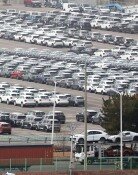Land Price Dances and Speculation Swells
Land Price Dances and Speculation Swells
Posted January. 29, 2004 22:23,
The land market is over-heated as piles of cash move from investing in apartments to investing in land. Various government-level announcements, which hint at lifting regulations on the land laws in the face of the coming general election, play a part in this overheating.
Meanwhile, cases have been reported in which investors have been defrauded by professional swindlers or have experienced loss due to their own mistakes while secret transactions are made in the process.
The real estate business analyzed on January 29 that investors are flocking to land with development projects such as the Gyeongbu and Honam High-speed Train, new city developments, and the transfer of the administrative capital city. By region, the hot areas are Asan, Dangjin, and Cheonan in Chungnam province; Gimpo, Paju, and Gwangmyeong in Gyeonggi; Incheon and Ganghwa, Gimcheon in Gyeongbuk; Gimje and Jeongeup in Joenbuk; Jangsun in Jennam.
Behind this zeal was the 10.29 Policy Plan which, last year, prohibited speculation about rebuilding apartments. As a result, the apartment market suddenly froze and investors have now landed in the land market where the regulations are comparatively less.
As an indicator, the price of rice paddies around the two-way regional roads near the new city development sites in Gimpo and Paju have increased by 10 to 20 percent in last three months, making the price per pyong around one million won.
An official at the land registration office of the Asan City Government in Chungnam said that 400 visitors per day on average visit the office to request land maps and land registers. This number is up by 20 percent this year.
Lands on public bid are also drawing attention in addition to the development sites.
This years national contract price rate (the rate comparing the highest bid price to the appraised value) for land on public bids is scattered around the 90 percent-level compared to that of the apartments which is at the 70 percent-level, according to Digital Taein, a public bid information provider. The land bid competition has been increasingly fierce since October last year.
The booming land investment is not without unexpected victims.
There have been five customers after the lunar new year holiday, complaining that they have been swindled, said CEO Jin Myeong-gi of JMK Planning, a land consulting firm, adding, There were only two or three of those at the largest per month last year.
Unfortunately, those investors had bought excessively high-priced lands, which are mostly useless, deceived by professional defrauders saying that the lands were expected to have been designated for spa development, building parks, and constructing roads.
CEO Nah Chang-geun of the Real Estate First offers the following words of advice, If somebody recommends investment in some place you dont know, you have to double-check by visiting related government offices to verify the development plan. In order to avoid getting swindled, one should make a decision only after acquiring enough information.
Cheol-Yong Lee lcy@donga.com







